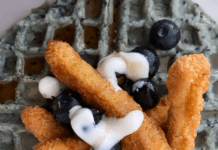 Disclaimer: This post uses identity-first language to adhere to the preferences of the community being discussed, as well as evolving scientific, professional, and journalistic standards.
Disclaimer: This post uses identity-first language to adhere to the preferences of the community being discussed, as well as evolving scientific, professional, and journalistic standards.
I suspect most people who participate in Light It Up Blue genuinely care about the autistic community. This may make what follows hard to hear. I challenge you to channel the compassion underlying your April efforts into learning more about what you can do to be a better ally for people you care about. Change is hard but often necessary to be a good ally.
Now for the challenging part…
If you love someone who is autistic, please don’t light it up blue.
If you appreciate and support the autistic community, please don’t light it up blue.
If you normally proudly light it up blue because you genuinely care, please choose to use autism acceptance month to learn something new and level up your allyship.
Why should you choose another form of engagement?
Light It Up Blue was spearheaded by Autism Speaks, a prominent autism charity that you may recognize. You may have even supported them in the past, as I did (I admit this because it is important to highlight the reality that when you know better, you can do better; it is okay to evolve and realize you were previously misguided).
You may not know there is a contentious relationship they have with the autistic community. The organization is considered highly problematic (also, here and here) by the community it is intended to serve. But this article isn’t about criticizing specific organizations. It is about education, allyship, and moving forward in a positive direction for the sake of a community I must assume you too support because you are still reading this. It is about finding ways to genuinely support the autistic community.
When we discuss other minority communities, it has become [rightfully] customary to defer to their sense of identity and their own lived experiences rather than allowing a majority group speak for them. This is not happening enough for the autistic community. Diverse, dynamic, and with a rich culture all their own, the autistic community is no less deserving of agency than any other minority group. To be a true ally is to embrace the neurodiversity movement, which includes listening to autistic voices.
WHAT IS NEURODIVERSITY? (Terms to Know as an Ally)
Neurodiversity: Neurodiversity is defined by Harvard Medical School as “…the idea that people experience and interact with the world around them in many different ways; there is no one “right” way of thinking, learning, and behaving, and differences are not viewed as deficits.” The term was originally coined by neurodivergent sociologist Judy Singer.
You can learn more about her take on neurodiversity here.
Neurotypical vs. Neurodivergent: Neurotypical describes someone who’s brain and cognition fall within psychologically and neurologically “average” boundaries; that is, people who are in the neuro-majority. The opposite of this term is neurodivergent, which refers to anyone with a brain that diverges from what is considered neurologically “typical”. Not all neurodivergents are autistic, though the term did originate in the autistic rights movement; the term has historically been used to describe people who are ADHD, or have dyslexia or another learning disability and also commonly includes people with OCD, epilepsy, Tourette’s syndrome, bipolar, speech disorders, depression, anxiety, and more. If that makes it sound like a large group, it is.
Allistic: Someone who is not autistic; there are neurotypical and neurodivergent allistics.
One major issue lies with many organizations, advocacy initiatives, and parent blogs on the subject; they are led partly or, more often, entirely by neurotypicals and allistics. Autism Speaks is one such organization. While some may note they have made efforts to change their practices in recent years, many autistics continue to feel alienated (or worse) by their practices and organizational structure. Ultimately, what matters most is the community of interest feels represented, and Light It Up Blue does not represent much of the autistic community. Therefore, as allies, we are called to find other ways to support autistics besides “Light It Up Blue.”
Autistics also point to numerous other problems with “Light It Up Blue” (and the broader autism awareness month), but rather than speak over their voices, I’ll direct you to their statements.
Learn more about issues with “Light It Up Blue” and autism awareness month from a few Autistic Bloggers and Self-Advocates:
So what can you do instead?
1. Scrap autism awareness month. Celebrate autistic acceptance, empowerment, and appreciation month instead!
2. Go #redinstead and substitute your puzzle piece for a rainbow or gold infinity symbol. You can learn more about the autistic community’s concerns with the puzzle piece symbol through many outlets, including here, here, here, here, and here. In short, puzzle pieces are problematic due to their long association with the notion that autistic people are defective (and require a cure or are “missing a piece”). Puzzle pieces were also not chosen by the broader autistic community to represent them. Please consider going with a symbol the community you want to be an ally of has chosen instead.
3. Take the month of April to learn more about the autistic community! Follow some excellent #actuallyautistic bloggers, support organizations led by autistics, and drop challenge your biases and ableism.
WHAT IS ABLEISM?
(definition via Merriam-Webster)– “discrimination or prejudice against individuals with disabilities”. While I almost never reference Wikipedia, in this case, it has a
, including some of the ways it presents in society such as inspiration porn, pity, infantilization, structural and policy barriers, etc.
Here is a list of just a few excellent organizations, resources, and advocates to check out:
Start with this excellent 101 Level Guide by Neuroclastic.
Nonprofits and Advocacy Groups
Autistic Women and Nonbinary Network
Autistic Self Advocacy Network
Recommended Podcasts
Bloggers and Self Advocates Parents Should Follow
Autistic, Typing (Was your child recently diagnosed autistic? Here is a great place to start, by Autistic, Typing)
Find even more great bloggers and self-advocates on Autistic, Typing’s page.




















